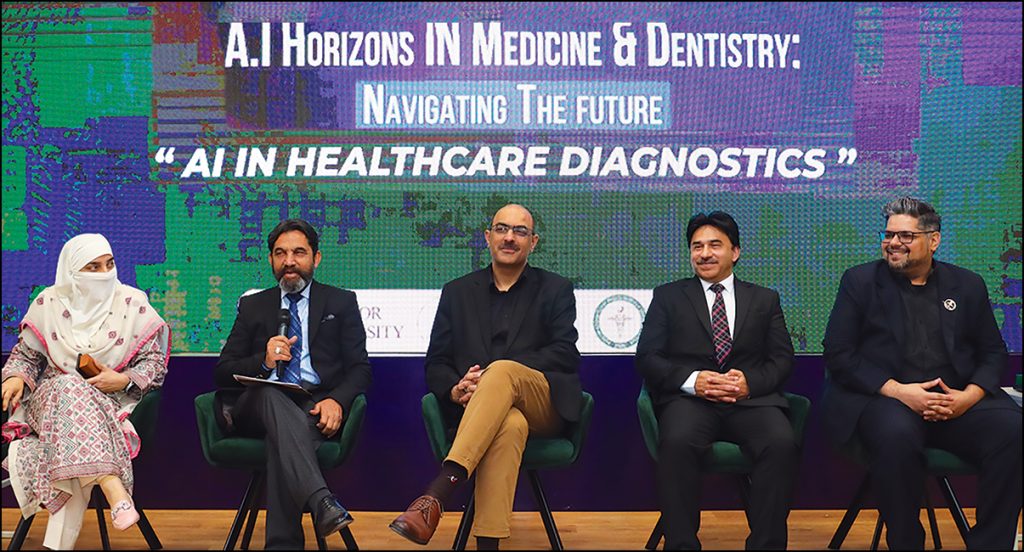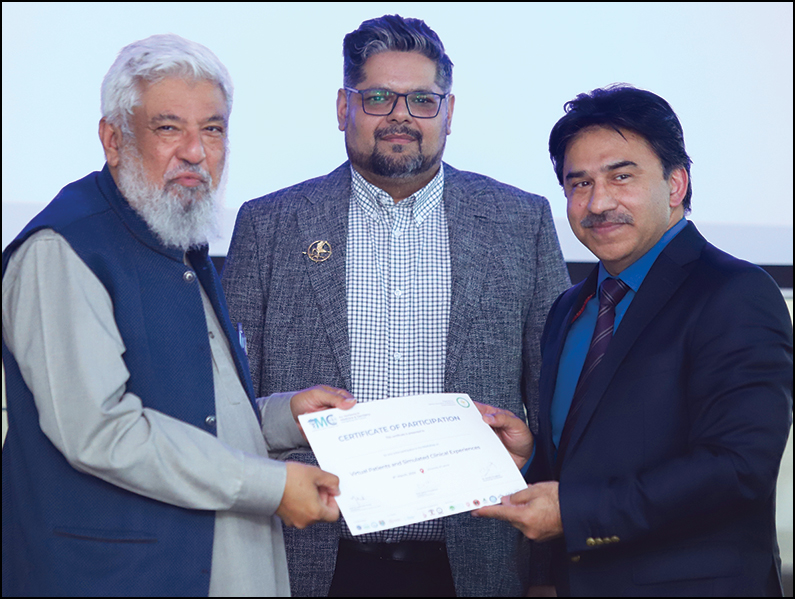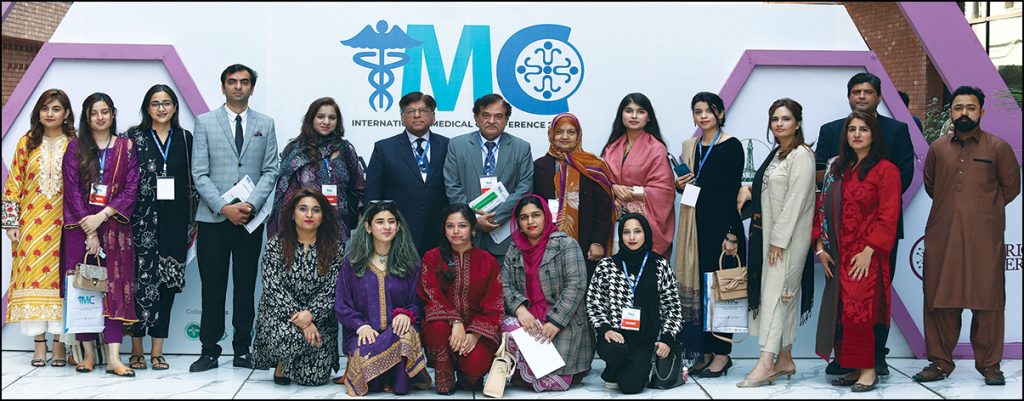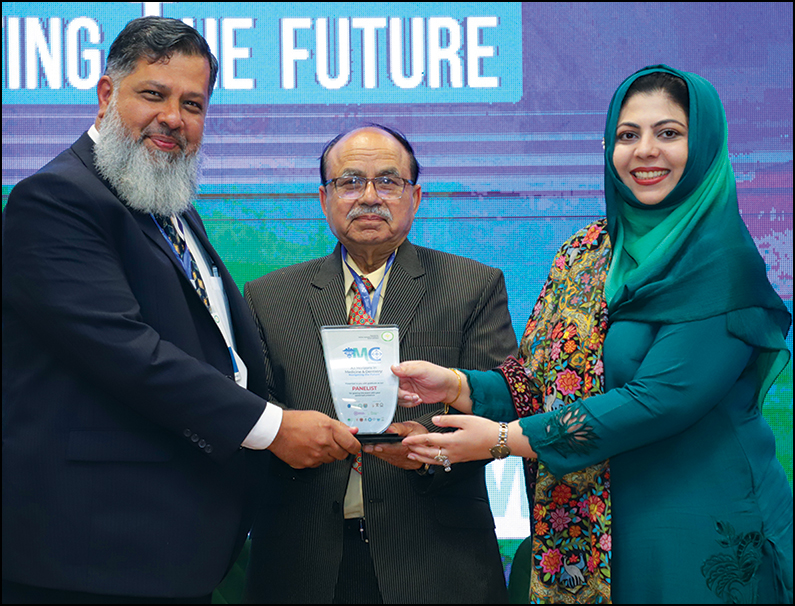It has potential application in oncology, dermatology and
domestic Care – Prof. Ibrar Hussain. Wearable technology
has revolutionized healthcare – Dr. Suhail Chughtai
LAHORE: The first scientific session during the International Medical Conference jointly organized by Superior University and University of Lahore in collaboration with Pakistan Association of Medical & Dental Institutions (PAMI) from March 4th to March 8th 2024 was devoted to use of Artificial Intelligence in Diagnostics.

Prof. Mulazim Husain Bukhari speaking at the panel discussion during the
first scientific session at IMC 2024 at UOL Lahore. Picture also shows
other members of the Experts panel sitting on the dais.
Dr. Usman Ijaz Bajwa from COMSTAC University Islamabad Lahore Campus was the first speaker who made a presentation on “Navigating the crossroads, AI and computer aided diagnostics”. He was of the view that we need to use AI to create solutions to our healthcare problems. AI can be effectively used to analyze X-rays images. It supports doctors to make more accurate tailored treatment to maximize efficacy, reduce side effects. It can be used to provide basic healthcare in remote and underprivileged areas of the country. It can also be used to improve maternal and child health. It can help authorities in effective prevention and control measures thereby reducing the healthcare costs.

Continuing Dr. Usman Ijaz Bajwa said that people have limited access to specialists in rural areas. Overwork can lead to fatigue and it can lead to miss diagnosis. At present we have unsustainable burden in healthcare system. AI tools can assist doctors but he did mention that noting can replace human intelligence but AI tools can assist the healthcare professionals. AI can also accelerate drug discovery, offer personalized medicine as it offers powerful tools. However, ethical concerns are challenges, other challenges include infrastructure gaps, limited availability of laboratory data. Academic institutions, he said, can develop AI tools, continue research and development of AI tools. He concluded his presentation by stating that AI has immense potential in transforming healthcare in Pakistan.

Prof. Shoab being presented certificate by Dr. Suhail Chughtai durning the
workshop on Virtual Patients and Simulated Clinical Experiences on last
day of the International Medical Conference held at University of Lahore.
Prof. Ibrar Hussain from University of Lahore was the next speaker who discussed “Application of Large Language Models in Healthcare”. AI, he said, has potential application in oncology, dermatology and domestic care. About one hundred AI tools are being developed daily. The number of users of GPT3 and now GPT4 has increased from billions to trillions. AI cannot replace human but it can be used in patient communication and education, get some information, can be used to answer questions. It can help patients understand medical conditions, medications, treatment plans. It can accelerate research and can successfully identify patients at risk of developing dementia.

Dr. Suhail Chughtai from London was the next speaker whose topic was “Designing AI solutions in medical and dental problems.” He discussed in detail integrating AI with wearable technology for real time health. We need to try to understand and provide the services on demand. Wearable technology, he stated, has revolutionized healthcare. He further pointed out that it is feared that about eighty-five million jobs will be lost due to AI. With increased use, it’s overall cost will decrease. AI offers quick sharable data. Devices can be stored but internet dependency remains an issue. He then referred to supervised, unsupervised learning and reinforced learning. Human beings get tired but there is no time constraint with the use of AI. Human beings need breaks for food intake but machines can go on working for days. Artificial Intelligence, Dr. Suhail Chughtai further stated can reduce medical errors, can help in anomaly detection. It can reduce the stress tremendously and chronic patients can be admitted at home thereby reducing the need for hospital beds.

Group photograph of some of the participants at the
International Medical Conference held at UOL Lahore.
One must ask good prompt, good questions to get correct answers. Cost of all these wearable devices is at present very high but when there is demand with increased use, cost will also decrease. Cost, he further stated, will not be a problem if consumers push it. Some of these projects require initial funding.
Panel Discussion
The presentations were followed by a panel discussion on Designing AI solutions for medical and dental problems. Members of the Experts panel included Dr. Yasin Niaz, Dr. Wajahat Qazi, Prof. Mulazim Husain Bokhari, Dr. Usman Akram, Prof. Faiza Farooq and Dr. Husain Askari. During the discussion it was pointed out that many institutions do not have good LLMS systems. There have been tremendous advances in radiology and it has become extremely difficult to keep pace with these developments.

Task of radiologists has become more complicated. We have to learn this technology to survive. We need to validate different software’s. Robotic surgery being used in some institutions in Pakistan is very expensive. We need to adopt AI early and start understanding it early. No doubt there is certain bias in AI as it is based on data put in. Humans have to take responsibility. With the use of AI dental cavity can be detected early and prevention can be planned.
Guest Lecture on Changing Face of Medicine
Prof. Dame Parveen Kumar from UK was the guest speaker in the next session and she talked about Changing Face of Medicine. She discussed in detail the changes seen in disease prevalence and therapies, inequality of rich and poor in many countries. There is shortage of healthcare professionals worldwide. Mental health, she said, is an important issue. Women, she opined, is the center of family if they are not empowered, it leads to poor health. Obesity is increasing while T2DM is an important comorbidity. There is increasing antimicrobial resistance. Other serious issues the world was facing today include climate change, refugee’s crisis, wars.
We need to train our juniors to work in these conditions. Air pollution has its adverse effects on health. She was of the view that poor countries are likely to face worst climate change. Other serious issues the world was facing today include climate change, refugee’s crisis, wars. We need to train our juniors to work in these conditions. Cholera, Enteric Fever, Typhoid, HAV, Dysentery, scabies, malaria and Dengue were some of the water related health problems. These are some of the consequences of climate change. Increased violence and tension between states are other serious issues. World had to face the after effects of lockdown due to Covid19 pandemic, Coal, oil and gas burnt has added new problems. Viruses remain a great danger. Malaria remains a problem while malnutrition increases the risk of cardiovascular diseases. She dealt at length on impact of climate change on human health. Women and children, Prof. Parveen Kumar said suffer the most in Wars. We are seeing re-emergence of old diseases while facing new diseases pandemics. All this has massive financial impact. Patients are the same, diseases are more of less the same but we also see some new diseases. She concluded her presentation by advocating that we need to work together and collaborate, we cannot afford having too many wars.

Prof. Mashwish Arooj along with Prof. M. Akbar Choudhury presenting
Mementoes to Dr. Duraiz Rehman at the concluding session
of IMC 2024 held at UOL Lahore.



